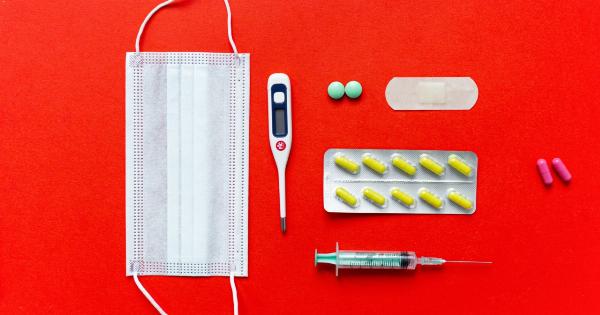As an athlete, it is essential to maintain a healthy lifestyle that includes regular exercise and proper nutrition. Vitamins are essential nutrients that play a significant role in maintaining a healthy body and providing support to the immune system.
Athletes require a higher amount of vitamins due to their increased physical activity and intense training. In this article, we will discuss the essential vitamins for athletes that contribute to their overall health and performance.
Vitamin C
Vitamin C is a water-soluble vitamin that acts as an antioxidant in the body.
It plays a vital role in supporting the immune system and aids in the formation of collagen, which is necessary for the maintenance of healthy bones, skin, and connective tissues. As an athlete, vitamin C can help prevent the breakdown of muscle tissue caused by intense physical activity and reduce the risk of infections caused by a weakened immune system.
Athletes can obtain vitamin C from natural sources like fruits and vegetables or take supplements.
Vitamin D
Vitamin D is an essential nutrient that helps the body absorb calcium, which is necessary for strong bones, teeth, and muscles. Athletes require adequate levels of vitamin D to support their intense training and prevent injuries.
Low levels of vitamin D can lead to muscle weakness, fatigue, and stress fractures. Athletes can obtain vitamin D from natural sources like sunlight or foods like fatty fish, egg yolks, and fortified milk products. Vitamin D supplements are also available for those who may be deficient or have limited exposure to sunlight.
Vitamin E
Vitamin E is a fat-soluble vitamin that acts as an antioxidant in the body. It helps protect the body from damage caused by free radicals, which are harmful substances that can damage cells and tissues.
As an athlete, vitamin E can support muscle recovery and reduce inflammation caused by intense physical activity. Athletes can obtain vitamin E from natural sources like nuts, seeds, avocados, and vegetable oils or take supplements.
Vitamin B6
Vitamin B6 is a water-soluble vitamin that plays a vital role in energy production and the metabolism of carbohydrates, proteins, and fats. As an athlete, vitamin B6 can help boost energy levels and support muscle growth and repair.
It also aids in the production of neurotransmitters, which are essential for cognitive function and mood regulation. Athletes can obtain vitamin B6 from natural sources like poultry, fish, bananas, and potatoes or take supplements.
Vitamin B12
Vitamin B12 is a water-soluble vitamin that plays a vital role in the production of red blood cells and the maintenance of a healthy nervous system. As an athlete, vitamin B12 can help prevent fatigue and boost energy levels.
It also aids in the metabolism of carbohydrates, which provides energy during physical activity. Athletes can obtain vitamin B12 from natural sources like meat, fish, dairy products, and fortified cereals or take supplements.
Folic Acid
Folic acid is a water-soluble vitamin that is essential for cell growth and division, as well as the production of red blood cells. As an athlete, folic acid can help support muscle growth and repair and prevent fatigue and weakness.
It also has anti-inflammatory properties that can reduce inflammation caused by intense physical activity. Athletes can obtain folic acid from natural sources like leafy green vegetables, broccoli, citrus fruits, and legumes or take supplements.
Niacin
Niacin is a water-soluble vitamin that plays a vital role in energy production and the metabolism of carbohydrates, proteins, and fats. As an athlete, niacin can help boost energy levels and support muscle growth and repair.
It also aids in the production of hormones that regulate blood sugar levels, which is essential during physical activity. Athletes can obtain niacin from natural sources like poultry, fish, peanuts, and fortified cereals or take supplements.
Thiamin
Thiamin is a water-soluble vitamin that plays a vital role in energy production and the metabolism of carbohydrates. As an athlete, thiamin can help boost energy levels and support muscle growth and repair.
It also aids in the production of neurotransmitters, which are essential for cognitive function and mood regulation. Athletes can obtain thiamin from natural sources like whole grains, pork, fish, and beans or take supplements.
Pantothenic Acid
Pantothenic acid is a water-soluble vitamin that plays a vital role in energy production and the metabolism of carbohydrates, proteins, and fats. As an athlete, pantothenic acid can help boost energy levels and support muscle growth and repair.
It also aids in the production of hormones that regulate blood sugar levels, which is essential during physical activity. Athletes can obtain pantothenic acid from natural sources like meat, fish, whole grains, and legumes or take supplements.
Riboflavin
Riboflavin is a water-soluble vitamin that plays a vital role in energy production and the metabolism of carbohydrates, proteins, and fats. As an athlete, riboflavin can help boost energy levels and support muscle growth and repair.
It also aids in the production of neurotransmitters, which are essential for cognitive function and mood regulation. Athletes can obtain riboflavin from natural sources like dairy products, eggs, lean meats, and leafy green vegetables or take supplements.
Conclusion
Vitamins are essential nutrients that play a significant role in maintaining a healthy body and providing support to the immune system. Athletes have increased nutritional requirements due to their intense physical activity and training.
Vitamins C, D, E, B6, B12, folic acid, niacin, thiamin, pantothenic acid, and riboflavin are essential vitamins for athletes that contribute to their overall health and performance. Natural sources of vitamins should always be the first choice, but supplements can be taken to ensure optimal intake of these essential nutrients.































